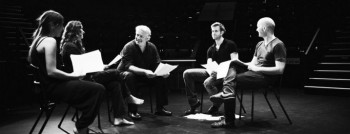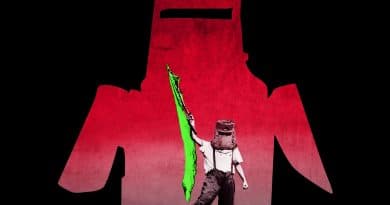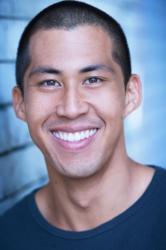Belief: The Furry underside of a Performer’s Passion

In the first article of his new column #GettingBugsBunny, Chris takes a look at self belief and some of the ways he has found to keep it.
If you are like the many who declare with various shades of pride that they are professional actors, then your childhood was likely filled with a great deal of enabling.
“But sir” you would cry to whichever adult was nearest, “the performing arts are my dream and dreams are worth fighting for!”
Tears would fill your crystalline eyes, your lower lip would tremble artistically and rivers of emotion would prepare to gush from out your face. And so it would come to pass that a legion of responsible adults who should have known better, bought into your pursuit. Perhaps they saw something of themselves in your youthful desperation. Perhaps your parents were paying a ridiculous amount of money. Whatever it was, slowly a community of creative support gently resolved around you.

In those halcyon days of summer, concerns like ‘type’ and ‘money’ were cobwebs to be swept aside in the tide of your burning enthusiasm. You would happily spend yours years traipsing off to classes, or to play-readings, or rehearsals of the local production of Les Miserables, because in the words of the venerated sage Carey, fame is only possible when you believe.
And boy did you.
Fast forward 5 years to the median experience of life as a professional actor, and the vast iceberg of negatives seems to be doing its best to crush the little boat that is your belief. You have made it through drama school. There are bills and failed auditions, There are difficulties with your agent (if you are fortunate enough to have one), and your retail job scours your soul. You have child support to pay, and everybody at each audition is bustier or taller or more muscular or flexible than you.
Now, in the few moments you have to yourself after a midnight shift at the local bar, you pause to take stock of your life choices. You see your childhood passion as the whimsy it was. A whimsy you have followed to financial ruin. You are about to break. A Chorus Line lied to you. Kissing today goodbye isn’t a good thing. Belief is not enough. Or is it?
It is my under-qualified, overly optimistic opinion that if you nurture your belief as some wild beast injured by poachers, eventually it will vanquish your enemies and do your dishes for you.
Here are my top 3 tips for nurturing your belief:
1. Go to the Theatre

“But Chris!” I hear you cry, “Theatre tickets are quite expensive!”
That’s okay – there are many creative ways to get into theatres. Sneaking in at intermission does the trick, so does extorting an usher to let you walk in unmolested. But if you are not wanting to risk lifetime bans or legal action, then perhaps you could apply for a casual position as an usher, or work at a theatre bar. Then of course there are the many professions that are related to the theatre – publicists, print and online journalists and their assistants, stage management or backstage mechanics, chaperoning. All of these have legitimate, work-related reasons for going to the theatre, and some of them are not as prohibitively difficult to gain access to as you might think. Why not fill both your creative belief and your bank account at the same time?
2. Think about your skills

Coz it don’t mean a thing, if it ain’t got that swing.
3. Find Allies
It’s a zero sum game. So if you didn’t get the job, chances are that someone out there just like you took it right out of your gaping maw. In fact, to the industry, there are entire demographics of people out there who are all minor variations of you. Logical response brings you to two paths. On the first you go on a Hunger Games-inspired killing spree where you track down and eliminate the jobbing actors in your locale who share your type. (CSI writers take notice.)
The second is that you work on your own point of difference to excel past the cloud of anonymity. This is the training and mentorship route which we mentioned just above. But what if I offered you a third choice – that you band together and reject the idea that it is a zero sum game? It’s about now that a deep feeling of unease should rise from your gullet. Band together? Form a Community? You mean help somebody else? But they are the enemy! Why should I teach somebody skills they will use to take work from me?
Because, my leech-like succubus of skill, if you have a policy of actively engaging with as many differential competencies as possible – and your competitors do not, you should have a distinctly broader and better developed skill-set. The more people you share with, the better your skill base, the greater your advantage over people who do not share as a community. Does that help you individually? It certainly does if you learn more than the other members in your community, then it introduces your ability to learn as a new avenue of competition. That is all of course under the assumption that things like ability and acting talent are fundamental reasons to be hired, but that is a ‘whole nother’ question for a ‘whole nother’ day.
Savvy Mate? That’s all for today, but do check back for more subtly subversive articles.
Until then, what are some of the ways you have of keeping your hunger hungry?
Hailing from the wind-blasted steppes of Mongolia, Chris Fung is a highly accomplished mathematician, award-winning potato grower, and habitual liar. Two specialties which have lent themselves perfectly to his current career in Musical Theatre. Chris met AussieTheatre Editor Erin James when they were both cast members of the Australian national tour of The King and I, wherein Chris was fortunate enough to understudy and play the title role to 25 audiences at the Princess Theatre in Melbourne. The King that is, not Mrs. Anna. Chris studied at the Queensland Conservatorium of Music (B. Musical Theatre), at Sydney University (B.A. in Performance Studies and Education) and at the School of Hard Knocks (B. ing a very bad man that nobody wanna mess with)




